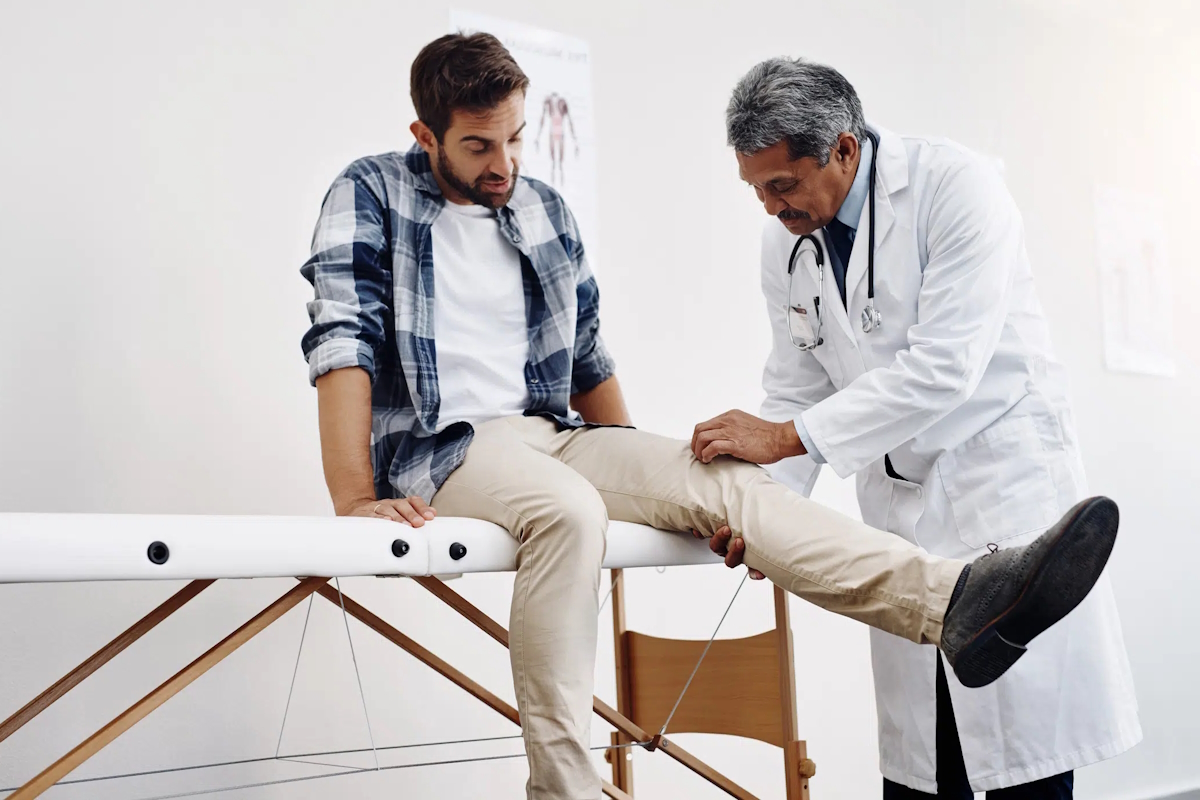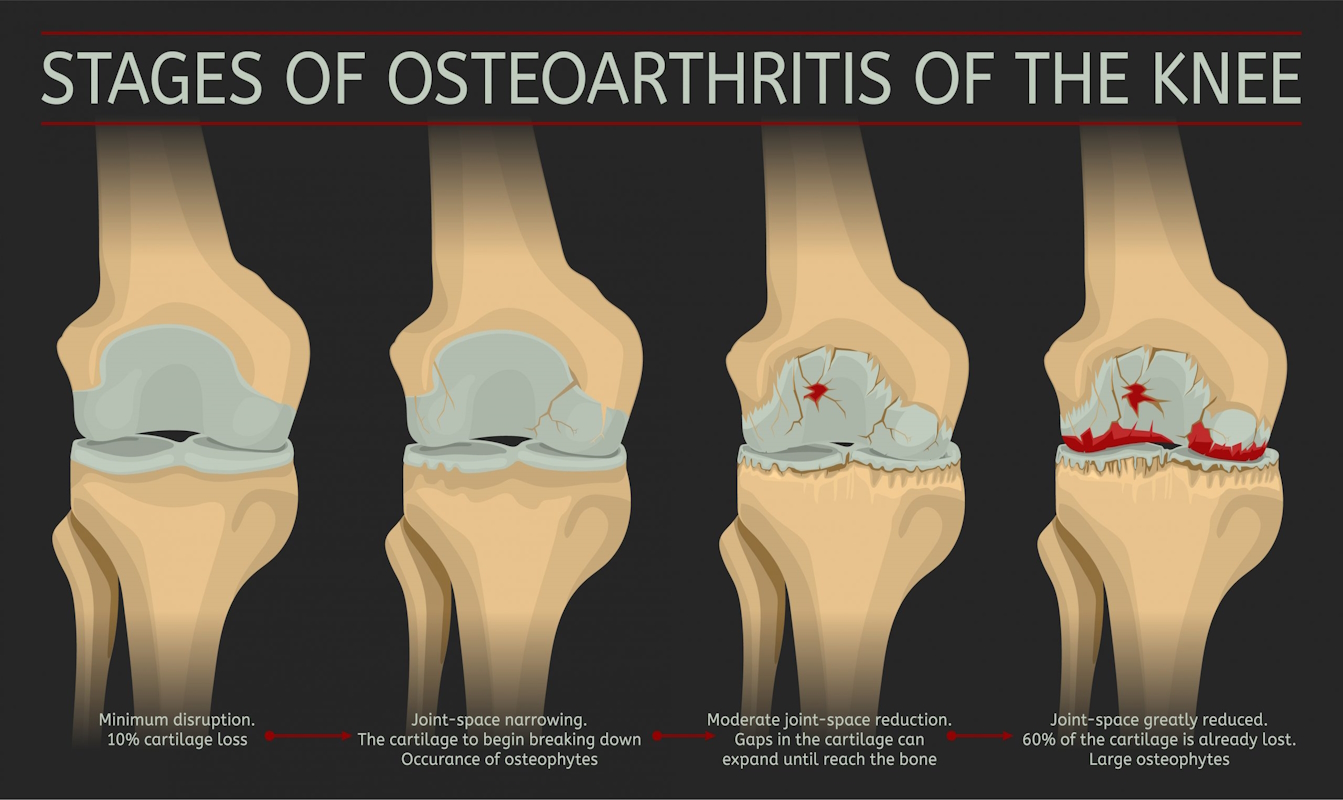Knee Replacement Surgery: Exploring Non-Surgical Alternatives
Author: StrideCare Internal Team

Jason’s knee has bothered him for decades. It all started with a football injury in high school that seemingly took forever to heal. But even after those issues were resolved, and he returned to his active lifestyle, the constant wear and tear over the past 30 years has led to the type of chronic pain, swelling, and stiffness associated with arthritis or osteoarthritis of the knee. All he wants is relief, and he’d prefer to find it without having to undergo knee replacement surgery and a lengthy recovery period. Could there be an alternative for Jason? After all, orthopedic surgeons typically stand by knee replacement as the ultimate solution.
At StrideCare, we understand how important it is for you to finally find relief from your chronic knee pain. And to be perfectly honest, surgery could be one solution to get you there. But if you’re like Jason* and determined to either avoid knee replacement surgery or delay it a bit longer, there are a few alternatives to consider.
Imagine Life Without These Knee Pain Symptoms
- Knee pain
- Stiffness, especially in the morning or after inactivity
- Decreased range of motion
- Inflammation and swelling
- The knee joint feels unstable or wobbly
- Creaking, crackling, and grating sensations
- The knee may lock or stick
- Knee pain from arthritis or osteoarthritis
Are you looking for relief from chronic knee pain? Schedule a consultation with StrideCare’s expert physicians.
Treat Knee Pain Without Surgery
We use our knees for bending, lifting, walking, twisting, running, jumping, climbing, and a litany of other daily tasks we often take for granted. And since our knees support most of the body’s weight, they will always be susceptible to pain, stiffness, and inflammation over time. Injuries, repeated stress on the knees, and age only exacerbate these issues. As a result, walking up and down stairs can gradually become more challenging, causing constant pain, and potentially buckling under pressure. One might struggle to run and jump and possibly hear a constant crackling or grating sensation upon extending the knees. These issues can severely impact a person’s mobility and quality of life.
Beyond injury as a reason for knee pain, researchers estimate that over 32.5 million U.S. adults have osteoarthritis. This degenerative joint disease that affects the knees and other joints has no cure and is one of the leading causes of disability and the most common form of arthritis overall—especially in older adults. Osteoarthritis is most common in people over 50, though younger individuals can experience it.

In advanced cases, patients may resort to total or partial knee replacement surgery. Just a few benefits include:
- Pain relief — Pain is significantly reduced or eliminated by replacing worn-out or damaged knee joints.
- Restored mobility — If cartilage is injured or damaged, knee joints simply don’t work as they used to. Knee replacement allows the knee joint to move more freely.
- Enhanced independence — More than regaining the ability to be active, you regain a sense of self-sufficiency.
- Reduced dependence on medication — Many people can reduce or eliminate their reliance on pain medication.
5 Alternatives to Knee Replacement Surgery
While knee replacement surgery is the choice for some people, it’s certainly not the only option for everyone. Non-surgical options exist and can be explored through conversations with your doctor. This is especially true if you want to avoid surgery at all costs or at least want to delay it a bit longer without sacrificing your quality of life.
Here are five alternatives to knee replacement surgery.
1. Anti-inflammatory medications
Your knee pain may respond well to over-the-counter medications such as non-steroidal anti-inflammatory drugs (NSAIDs). This includes aspirin, naproxen, and ibuprofen. In some cases, prescription medications like COX-2 inhibitors may be recommended for their stronger anti-inflammatory effects. These drugs are designed to reduce inflammation and alleviate pressure on the knee joint and surrounding muscles, nerves, tendons, and ligaments. When inflammation is removed, patients experience improved mobility and less pain. However, while NSAIDs can provide temporary relief, they may not address the underlying cause of the pain.

2. Joint injections
Gel injections are often considered as a first step to avoiding or delaying knee replacement surgery. In fact, a study from 2019 found that newer versions of these injections can be just as effective as the older ones that need to be done once per week. Gel knee injections contain hyaluronic acid, a natural compound found in the synovial fluid of our joints. Basically, it’s like a gel-like substance that helps to lubricate our joints, reduce inflammation, and even promote the growth of bone and cartilage. Unfortunately, this is only a temporary solution. If someone has osteoarthritis, which is a progressive disease, eventually surgery might still be recommended.
3. Stem cell knee replacement
With this experimental procedure, blood is taken from the patient and processed to concentrate the stem cells so that they can be injected directly into the damaged areas of the knee. By using stem cells, this therapy taps into the body’s natural healing powers to repair damaged cartilage, slow down and repair damage, reduce pain and inflammation. Currently this treatment isn’t widely recommended by major medical organizations like the Arthritis Foundation, the American College of Rheumatology, and the FDA due to the lack of solid evidence to prove its safety and effectiveness.
4. Unispacer knee replacement alternative
When someone has osteoarthritis, their knee cartilage starts to wear away, causing the femur and tibia bones to rub against each other. This can lead to pain, stiffness, inflammation, and even bone spurs. The Unispacer is a little spacer that gets inserted into the knee joint. Its main job is to keep leg bones separate and prevent them from rubbing together. The Unispacer is a less invasive procedure compared to full-on knee replacement surgery. But it’s not the most effective option for patients dealing with advanced arthritis. It may work better for those in the earlier stages of the condition.
Are you experiencing knee pain that’s interrupting your quality of life? Schedule a consultation with StrideCare’s expert physicians.
5. Genicular Artery Embolization (GAE)
GAE is a groundbreaking procedure that can limit pain and reduce inflammation by focusing on the arteries that supply blood flow to the cruciate ligaments and synovial fluid. There are six of these genicular arteries in and around the knee, and by blocking them, persistent inflammation associated with knee osteoarthritis can be reduced.

Here’s how GAE works:
- Patients are given medicine to help them feel sleepy and comfortable during the procedure.
- A small catheter is inserted into the artery in the patient’s upper thigh or ankle and is guided by X-ray to the arteries supplying blood to the lining of the knee.
- Once the catheter is in position, the doctor will inject small particles to block blood supply.
- The patient experiences the benefits of reduced inflammation within two weeks, resulting in less pain.
The entire procedure takes roughly 45-60 minutes. Furthermore, GAE is a painless outpatient procedure. Patients go home within 1-2 hours after the procedure. The results of genicular artery embolization have shown this can be a long-lasting therapy to treat patients with symptomatic knee osteoarthritis simply by reducing synovial arterial hypervascularity. In one study of 40 subjects over a 10-month period, success was achieved in 100% of the subjects.
Are You Eligible for Genicular Artery Embolization?
GAE is a non-surgical treatment alternative for patients with knee pain due to osteoarthritis who have failed conservative therapy, such as anti-inflammatory medications or knee injections, and who do not wish to undergo or are ineligible for knee replacement surgery. It is performed by a physician who is specially trained to use imaging modalities to see in the body and treat diseases without surgery and has specific expertise pertaining to the vascular system and blood vessels of the body.
GAE is 97.5% effective, with no need for knee surgery. Patients interested in GAE must meet the following criteria:
- Age between 40-80 years old with moderate to severe knee pain and local knee tenderness
- Osteoarthritis based on X-ray but without bony deformities or sclerosis
- Knee pain resisted conservative treatment (medication, physical therapy, joint injections, etc.)

StrideCare Wants To Help You Avoid Knee Replacement Surgery
It may not be possible to avoid knee pain. As we age, our joints simply don’t work quite like they used to. This is especially true if we suffer injuries, create repeated stress on our knees, or lead unhealthy lifestyles. But knee replacement surgery doesn’t always have to be the only option. You do have non-surgical options.
Our groundbreaking Genicular Artery Embolization (GAE) procedure can provide lasting relief for many of the common wear and tear symptoms you’re currently experiencing. More good news: treatments are covered by most medical insurances and Medicare. Plus, you can be treated at StrideCare’s outpatient clinics without ever having to visit the hospital.
StrideCare has long been a leader in multi-specialty care for treating lower-extremity vascular and podiatric conditions. That includes our ability to perform leading-edge procedures to treat artery and vein disease and symptoms that, while minor in their earliest stages, can eventually lead to more serious and life interrupting issues. The experts at StrideCare will recommend an individualized plan to help you get the best results.
Please contact us at 866-552-4866 or complete the appointment form to schedule a consultation. We are here to help, all while providing compassionate patient care.
This information is not a substitute for professional medical advice. Prior to starting any new treatment or questions regarding a medical condition, always seek the advice of your doctor or other qualified health provider.
StrideCare serves North Texas and South Texas communities, including Dallas, Mesquite, Addison, Arlington, Plano, McKinney, Craig Ranch, Prosper, Flower Mound, Euless, Southlake, South Dallas, Sherman, Irving, Garland, Carrollton, Rowlett, Coppell, Forney, Rockwall, Houston, Sugar Land, Katy, Webster, Clear Lake, The Woodlands, Lake Jackson, San Antonio, Stone Oak, Austin, Round Rock, Bastrop, Brushy Creek, Cedar Park, Converse, Georgetown, Hutto, Kyle, Leander, Marble Falls, New Braunfels, Pasadena, Pearland, Pflugerville, San Marcos, Schertz, Bay City, Universal City, Spring, Kingwood, Stafford, Conroe, Texas City, Cypress, League City, Bellaire, and more.
*Patient stories are true. Names and/or photos may be changed to protect patient confidentiality.


